ElasticSearch+NLog+Elmah实现Asp.Net分布式日志管理
ElasticSearch简介
ElasticSearch是一个基于Lucene的搜索服务器。
它提供了一个分布式多用户能力的全文搜索引擎,基于RESTful web接口。
Elasticsearch是用Java开发的,并作为Apache许可条款下的开放源码发布,是第二流行的企业搜索引擎。
希望我们的搜索解决方案要快,希望有一个零配置和一个完全免费的搜索模式,我们希望能够简单地使用JSON通过HTTP的索引数据,我们希望我们的搜索服务器始终可用,我们希望能够一台开始并扩展到数百,我们要实时搜索,我们要简单的多租户,我们希望建立一个云的解决方案。Elasticsearch旨在解决所有这些问题和更多的问题。
ElasticSearch的Schema与其它DB比较:

ElasticSearch三方访问方式:

环境是CentOS6.4,安装方法有好几种,在这儿我们直接从官网下载包, 1.71版解压后,进入目录执行:
bin/elasticsearch
检查服务是否正常工作:
curl -X GET http://localhost:9200/
elasticsearch默认是9200端口,返回一个JSON数据,有版本说明运行正常。
elasticsearch的伸缩性很高,如下示例数据分片:
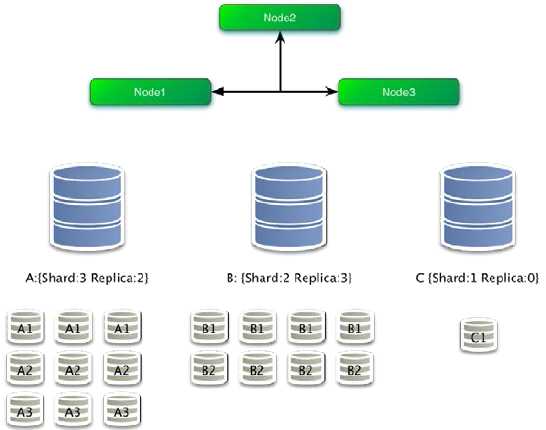
安装前端elasticsearch-head:
elasticsearch/bin/plugin –install mobz/elasticsearch-head
打开 http://localhost:9200/_plugin/head/,可以看如下UI,此处我们配置IP是192.168.0.103,它多语言版,已经自动识别为中文UI
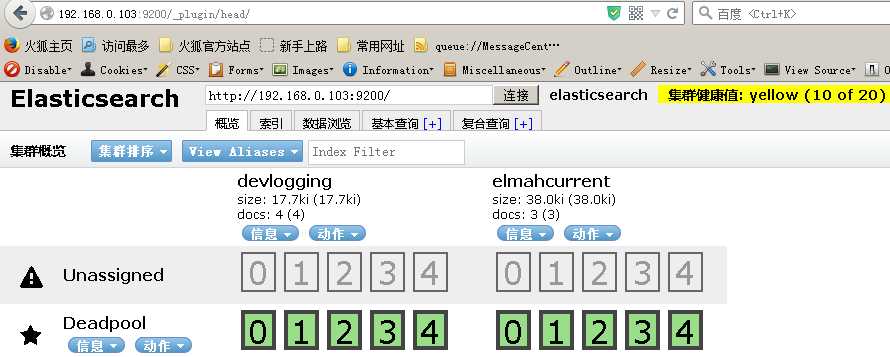
在这儿我们还安装一个管理结点的前端 bigdesk, 安装方式类似,也是推荐插件模式:
$ ./bin/plugin -install lukas-vlcek/bigdesk/<bigdesk_version>
http://192.168.0.103:9200/_plugin/bigdesk/ 之后UI是这样的:
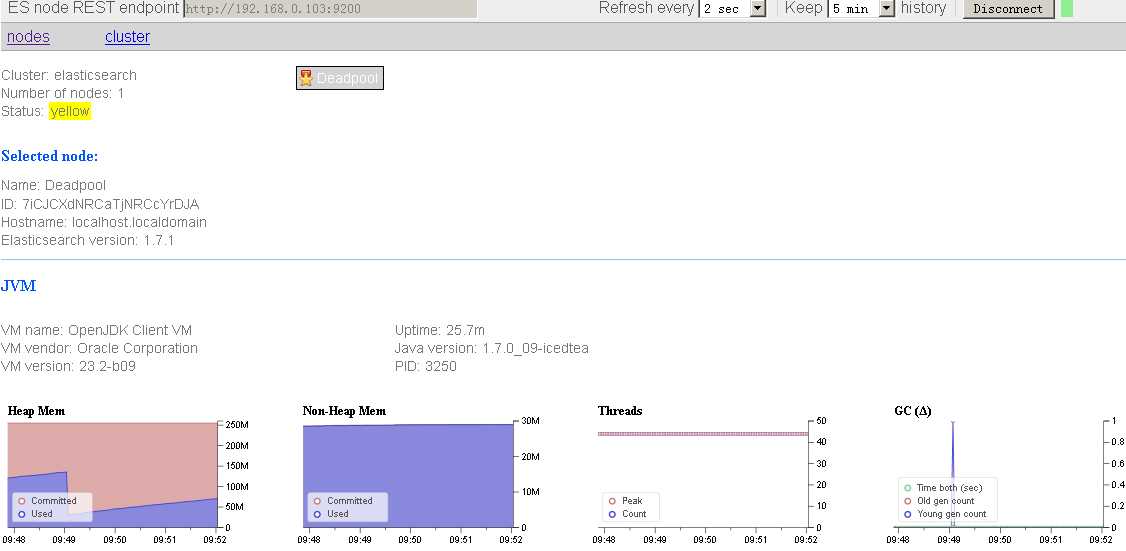
还有其他的前端项目,在这儿我们不一 一 描述,其目的为了更好的管理ElasticSearch集群。
ElasticSearch与Asp.net应用程序集成
好了,我们在Asp.net项目中已经安装Elmah,现在我们安装 Elmah.Elasticsearch,这里是1.1.0.27:
PM> Install-Package Elmah.Elasticsearch
web.config中配置节,我们配置index名称:elmahCurrent
<elmah>
<!--
See http://code.google.com/p/elmah/wiki/SecuringErrorLogPages for
more information on remote access and securing ELMAH.
--><security allowRemoteAccess="true" />
<errorLog type="Elmah.Io.ElasticSearch.ElasticSearchErrorLog, Elmah.Io.ElasticSearch" connectionStringName="ElmahIoElasticSearch" defaultIndex="elmahCurrent" />
</elmah>
连接字符串增加
<connectionStrings> <add name="ElmahIoElasticSearch" connectionString="http://192.168.0.103:9200/" /> </connectionStrings>
让我们来访问一个不存在http://localhost:1960/KK webpage 故意引发异常,然后我们到前端head里可以看到:
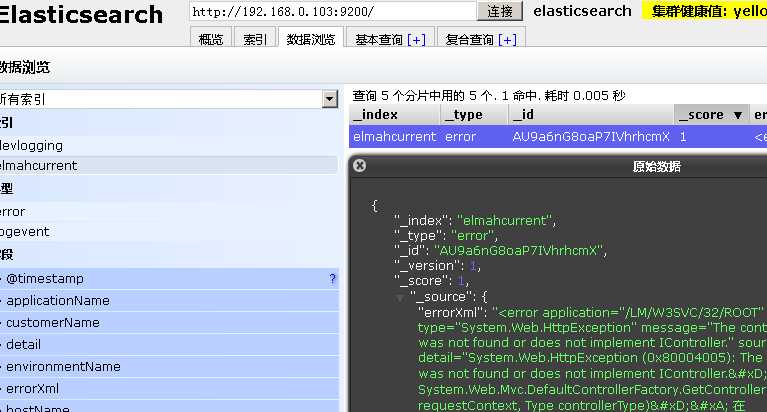
完整记录JSON数据,当然也可以使用查询方式。
接下来,让我们来配置NLOG的日志也输出到ElasticSearch,先安装包 NLog.Targets.ElasticSearch 1.0.14
PM> Install-Package NLog.Targets.ElasticSearch
对应的NLog.config文件是这样的,看加粗字体:
<?xml version="1.0" encoding="utf-8" ?>
<nlog xmlns="http://www.nlog-project.org/schemas/NLog.xsd" xmlns:xsi="http://www.w3.org/2001/XMLSchema-instance">
<extensions>
<add assembly="NLog.Targets.ElasticSearch"/>
</extensions>
<targets async="true">
<strong> <target name="elastic" xsi:type="ElasticSearch" uri="http://192.168.0.103:9200/" index="DevLogging" documentType="logevent"></strong>
</target>
<target name="asyncFile" xsi:type="AsyncWrapper">
<target xsi:type="File" name="f" fileName="${basedir}/logs/${shortdate}.log"
layout="${longdate} ${logger} ${uppercase:${level}} ${message} ${exception:format=ToString,StackTrace,method:maxInnerExceptionLevel=5:innerFormat=ToString}" />
</target>
</targets>
<rules>
<logger name="*" minlevel="Trace" writeTo="f" />
<strong> <logger name="*" minlevel="Trace" writeTo="elastic" /></strong>
</rules>
</nlog>
这样我们可以把非异常的日志自由输出到ElasticSearch中,例如我们记录webapi请求的日志:
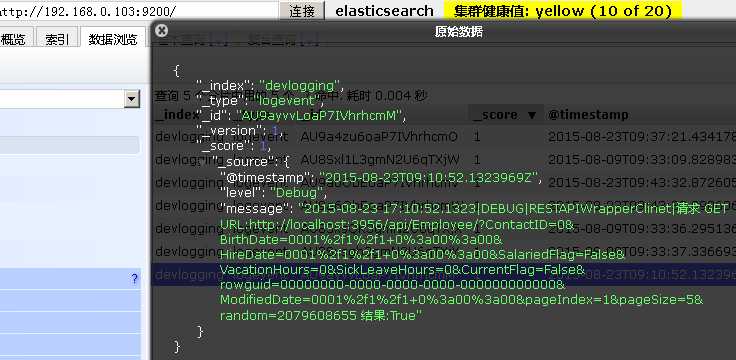
devlogging是我们在配置文件已配置过的index名称。 我们同时使用NLOG记录了文件日志。
搜索:
基于REST方式请求按ID查询:
http://localhost:9200/<index>/<type>/<id>.
如:
http://192.168.0.103:9200/devlogging/logevent/AU9a4zu6oaP7IVhrhcmO
还有一些搜索示例如下:
//索引
$ curl -XPUT http://localhost:9200/twitter/tweet/2 -d ‘{
"user": "kimchy",
"post_date": "2009-11-15T14:12:12",
"message": "You know, for Search"
}‘
//lucene语法方式的查询
$ curl -XGET http://localhost:9200/twitter/tweet/_search?q=user:kimchy
//query DSL方式查询
$ curl -XGET http://localhost:9200/twitter/tweet/_search -d ‘{
"query" : {
"term" : { "user": "kimchy" }
}
}‘
//query DSL方式查询
$ curl -XGET http://localhost:9200/twitter/_search?pretty=true -d ‘{
"query" : {
"range" : {
"post_date" : {
"from" : "2009-11-15T13:00:00",
"to" : "2009-11-15T14:30:00"
}
}
}
}‘
我们可以配置多个应用程序的日志统一输出到ES中,以便于我们查询与分析。
